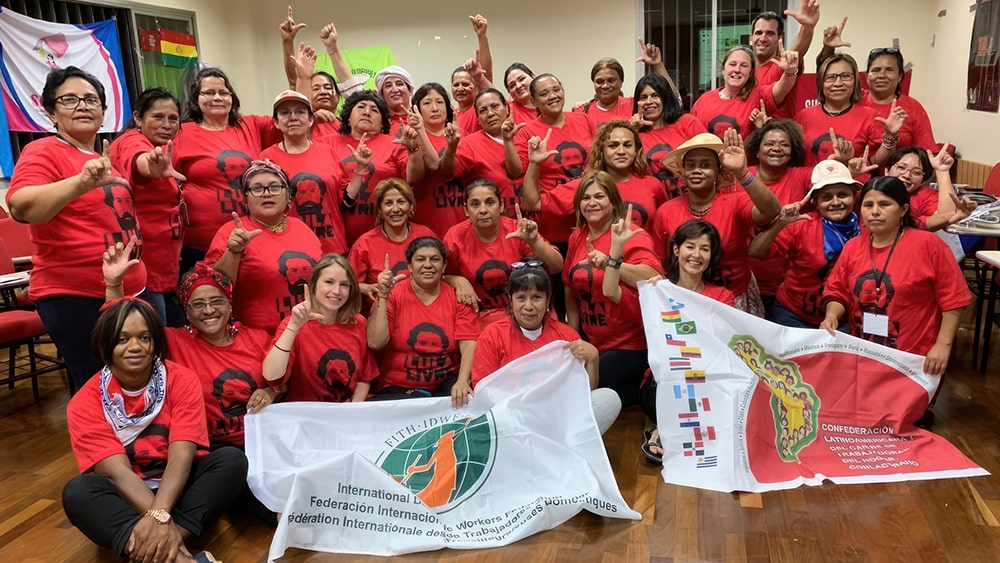With hard work and dedication,
Offering care and love without hesitation,
Respectful and selfless, day by day,
Keeping homes and families in order, in every way,
Empowering women through their labor,
Recognizing their value and their fervor,
Salute the domestic workers on this special day,
Dedicated, hardworking, and always on the way,
As we celebrate their contributions and might,
Yearning for a world that treats them right.
Happy Workers’ Day to ALL domestic workers.
Today, as we celebrate our 10th May Day together as a global federation, our belief is firmer than ever before: tangible change in domestic workers’ realities is only possible through the efforts from the base for the base. In this time together, we worked for domestic workers to be seen, and most importantly heard.
Against centuries of invisibility, the rhetorical recognition that the world is being cared for by women and workers of the informal economy, i.e. by domestic workers, has grown, especially with COVID-19 sweeping the world and shutting down economies. However, it remained largely incomplete without action to mend the deep repercussions sustained by our sector.
Against a backdrop of the global pandemic, many domestic workers lost their jobs as households tightened their budgets or were reluctant to have workers enter their homes for fear of infection. The situation was exacerbated by their inability to access governmental provisions such as social security. This sudden decrease in demand for their services led to a significant reduction in their wages. Even for those who managed to keep their jobs, many employers reduced the number of hours that domestic workers could work. With fewer hours, their overall income decreased, and they struggled to make ends meet. Some employers took advantage of the pandemic to renegotiate the terms of their domestic workers’ employment, resulting in lower pay rates. This was often the case for those who had no written contract and were not unionized, making them more vulnerable to exploitation. With so many domestic workers losing their jobs, there was increased competition for the remaining positions, driving down wages as employers could choose from a larger pool of potential workers. Despite the reopening of economies and the rhetorical recognition of the care work that domestic workers undertake, many of them are still struggling to make ends meet, and their wages have not increased to pre-pandemic levels.
Seen and heard, their demands must be acted upon immediately!
Therefore, on this May Day, we stress the need for transformative policy intervention to eradicate the systemic conditions sustaining poverty in domestic work. Domestic Workers demand:
Recognition and Dignity:
Recognizing domestic work as work means the extension of legal and social protection programs specifically designed for domestic workers, such as access to healthcare and retirement benefits, as well as ensuring that domestic workers receive fair wages that are commensurate with their skills and experience. Governments should also establish regulations that ensure domestic workers have safe working conditions, including protections against harassment and abuse. Most importantly, these provisions should be implemented and enforced.
Data collection:
Governments can collect data on the number of domestic workers, their working conditions, and their contributions to the economy, which can help inform policy decisions and ensure that the care infrastructure is meeting the needs of domestic workers. This is particularly important to address vis-a-vis their massive contribution in alleviating the gaps in institutional care, as most studies only consider unpaid care and/or workers in the public service sector when addressing the reform of care infrastructure.
Skills Training and Development:
Domestic work is skilled work, but most governments do not have a skills-recognition system. Governments should not only invest in training and education programs that improve the skills of domestic workers to improve the service they provide, but to also support transformative action to the sector as a whole, to advance careers and recognize and adequately compensate skills.
Eradicating poverty for domestic workers is possible through redefining the “what” and “who” of the care economy by recognizing domestic work as a central block or central piece to the puzzle of social justice.
Domestic workers are care workers and must be cared for.
Download Statement







